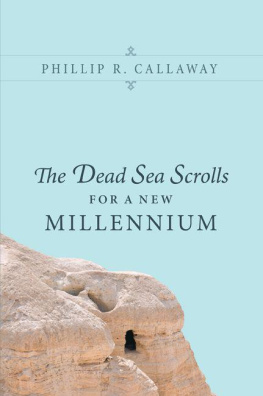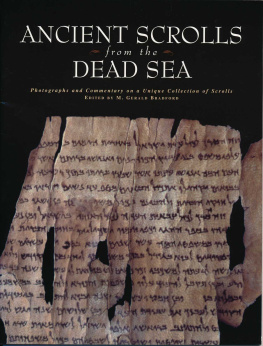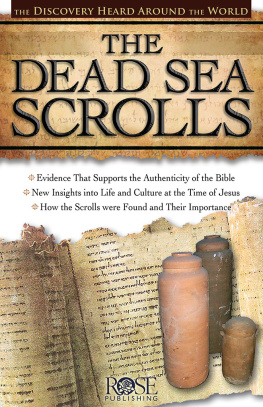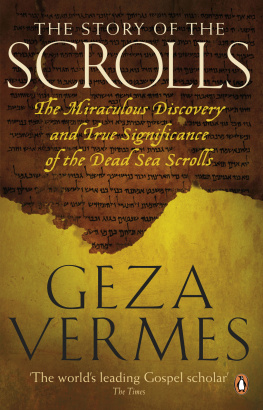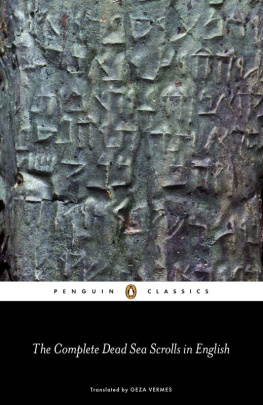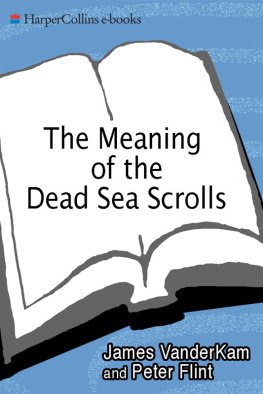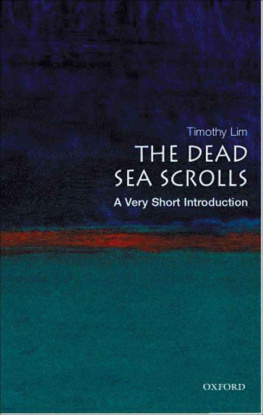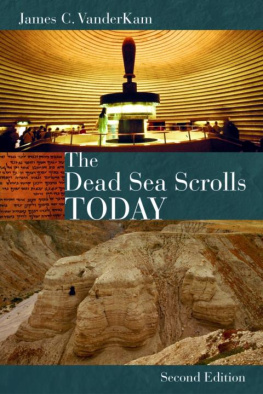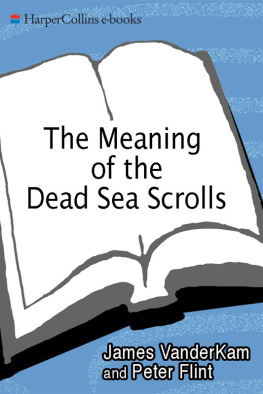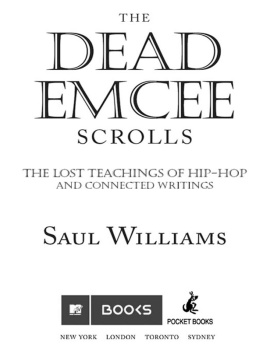Phillip R. Callaway - The Dead Sea Scrolls for a New Millennium
Here you can read online Phillip R. Callaway - The Dead Sea Scrolls for a New Millennium full text of the book (entire story) in english for free. Download pdf and epub, get meaning, cover and reviews about this ebook. year: 2011, publisher: Cascade Books, genre: Romance novel. Description of the work, (preface) as well as reviews are available. Best literature library LitArk.com created for fans of good reading and offers a wide selection of genres:
Romance novel
Science fiction
Adventure
Detective
Science
History
Home and family
Prose
Art
Politics
Computer
Non-fiction
Religion
Business
Children
Humor
Choose a favorite category and find really read worthwhile books. Enjoy immersion in the world of imagination, feel the emotions of the characters or learn something new for yourself, make an fascinating discovery.
- Book:The Dead Sea Scrolls for a New Millennium
- Author:
- Publisher:Cascade Books
- Genre:
- Year:2011
- Rating:3 / 5
- Favourites:Add to favourites
- Your mark:
- 60
- 1
- 2
- 3
- 4
- 5
The Dead Sea Scrolls for a New Millennium: summary, description and annotation
We offer to read an annotation, description, summary or preface (depends on what the author of the book "The Dead Sea Scrolls for a New Millennium" wrote himself). If you haven't found the necessary information about the book — write in the comments, we will try to find it.
The Dead Sea Scrolls for a New Millennium — read online for free the complete book (whole text) full work
Below is the text of the book, divided by pages. System saving the place of the last page read, allows you to conveniently read the book "The Dead Sea Scrolls for a New Millennium" online for free, without having to search again every time where you left off. Put a bookmark, and you can go to the page where you finished reading at any time.
Font size:
Interval:
Bookmark:
The Dead Sea Scrolls for a New Millennium
PHILLIP R. CALLAWAY

Welcome

About the Author
Copyright 2011 Phillip R. Callaway. All rights reserved. Except for brief quotations in critical publications or reviews, no part of this book may be reproduced in any manner without prior written permission from the publisher. Write: Permissions, Wipf and Stock Publishers, W. th Ave., Suite , Eugene, OR 97401 .
Cascade Books
An Imprint of Wipf and Stock Publishers
W. th Ave., Suite
Eugene, OR 97401
www.wipfandstock.com
ISBN : - - 60899 - -
Cataloging-in-Publication data:
Callaway, Phillip R.
The Dead Sea scrolls for a new millennium / Phillip R. Callaway.
xii + p. ; cmIncludes bibliographical references and index.
ISBN : - - 60899 - -
. Dead Sea scrolls. . Dead Sea scrollsHistory. . Qumran communityHistory. I. Title.
BM C 2011
Manufactured in the U.S.A.
Scriptural quotations are from the Oxford Annotated Bible/Revised Standard Version 1962 .
Pitts Theology Library, Emory University for use of images from their Digital Image Archives 2011
Paleography of the Scrolls, Treasure Locations of the Copper Scroll, and Temple Scrolls Courts are from Philip R. Davies, George J. Brooke, and Phillip R. Callaway, The Complete World of the Dead Sea Scrolls . London: Thames & Hudson 2002
Map of Israel in New Testament Times is from http://www.bible.history.com/maps/palestine_nt_times.html 2011
To Azusa
Maps, Illustrations, and Tables
Illustrations
Temple Scrolls Courts
Treasure Locations of the Copper Scroll
Map of Israel in New Testament Times
Scholars and Scribes
Paleography of the Scrolls
Ezra in Prayer
Creation of Adam and Eve
The Prophet Isaiah
Noahs Ark and the Flood
Map of Ancient Jerusalem
Rebuilding the Jerusalem Temple
The Convent of St. Saba
Tables
Chronology of Jewish History
Discoveries in the Judaean Desert
Comparison of de Vaux and Magness
Translation of Prophetic Text on Stone
Scrolls and Palaeographical Periodization
Biblical Book and Number of Qumran Manuscripts
Table of Contents: Temple Scroll
The -Day Calendar
A Sabbath Primer
Some Works of the Law ( QMMT): Manuscripts, Contents,
Paleographical Periods
Phylacteries: Comparison of Rashi and Rabbenu Tam
Preface
S TUDYING THE D EAD S EA Scrolls is a fascinating way to spend ones life. Along the way you are permitted to share what you have learned with others who care about the Scrolls. You are constantly asking yourself what they meant in the past and what they might mean for the future. My fortune has been to have been introduced to the Scrolls by John H. Hayes in his class on the Apocrypha and Pseudepigrapha at Emory University in Atlanta, Georgia. It was amazing to discover that so much ancient Jewish literature had not been part of the canon I knew. Hayes also introduced me to Josephus Antiquities , War , and Life . With Hartmut Stegemann at the Qumranforschungsstelle in Marburg and Gttingen, Germany I first read Yadins Hebrew transcription of the Temple Scroll , the Aramaic fragments of Enoch, got a taste of Some of the Works of the Law , and realized that reconstructing history is a very human enterprise just as is the reconstruction of partial scrolls. In Philip R. Davies, a stimulating conversationalist, I found a scholar of similar curiosity and a willingness to question the status quo in Dead Sea Scrolls studies.
When I study the series Discoveries in the Judaean Desert (DJD), I understand how much I have learned from and admire the editors of each volume in that incredible scholarly series. No doubt, I have also profited from all the preliminary editions that I have read in the journals and several editions of scrolls outside DJD. No doubt, I have also been influenced by numerous authors who have written on the Scrolls.
Above all, studying the Dead Sea Scrolls has shown me that I, too, am one of those clearing a path in wilderness, which is mentioned in Isaiah and the Rule of the Community ( QS). I too have spent a goodly portion of my life reading and re-reading the ancient manuscripts trying to get to know their authors, editors, and scribes, attempting to understand why they would think such a thing and decide to write it down. The first part of my personal journey with the Scrolls focused on the -day calendar as a central reason for the emergence of the Qumran community. In the next stage of my adventure I asked quite seriously whether one can reconstruct a history of the Qumran community based on the language of the so-called historical Scrolls. I did this because I wanted to study history and not theology. The Dead Sea Scrolls are certainly historical, but preserve little material for writing a history of the Qumran community within the broader context of Second Temple Judaism. In the last twenty years I began to feel that the Scrolls represent the library or personal collections of people like Ben Sira and his grandfather. In short, I realized that the Scrolls are not the vestiges of an insignificant hyper-orthodox group that rejected everything about their traditions. In fact, just the opposite seems to be the case. The Dead Sea Scrolls represent the largest collection of Jewish literature in Hebrew, Aramaic, and Greek that existed in the Second Temple period and, for that matter, in the First Temple period. It is a very traditional collection compared with the historical writings of Josephus and the philosophical tomes of Philo. Nevertheless, it has its own emphases and surprises.
As supplemental or comparative reading to The Dead Sea Scrolls for a New Millennium , I would also like to recommend James C. VanderKams The Dead Sea Scrolls Today ( 2010 ), Lawrence H. Schiffmans Reclaiming the Dead Sea Scrolls ( 1994 ), Hartmut Stegemanns The Library of Qumran ( 1998 ), Martin Abegg, Jr., Peter Flint, and Eugene Ulrichs, The Dead Sea Scrolls Bible ( 1999 ), and Geza Vermes, The Complete Dead Sea Scrolls in English ( 1997 ).
English quotations from the Jewish Bible come from my copy of the Oxford Annotated Bible/Revised Standard Version ( 1962 ). English quotations of the non-biblical Scrolls derive from Geza Vermes translation, The Complete Dead Sea Scrolls in English ( 1997 ). English quotations of readings from the biblical manuscripts depend greatly on the translation of Abegg, Flint, and Ulrich, The Dead Sea Scrolls Bible ( 1999 ).
Abbreviations
Ant. Josephus, Antiquities of the Judeans
b. Babylonian Talmud ( Babli )
BA Biblical Archaeologist
BAR Biblical Archaeology Review
BASOR Bulletin of the American Schools of Oriental Research
Bib Biblica
BR Bible Review
col. column
DSD Dead Sea Discoveries
frag. fragment
IEJ Israel Exploration Journal
JBLSup Journal of Biblical Literature Supplement
JJS Journal of Jewish Studies
JSOTSup Journal for the Study of the Old Testament Supplements
l. line
LXX Septuagint
m. Mishnah
MT Masoretic text
NTS New Testament Studies
PJBR The Polish Journal for Biblical Research
QC The Qumran Chronicle
RB Revue Biblique
RQ Revue de Qumran
Sam Samaritan Pentateuch
STDJ Studies on the Texts of the Desert of Judah
VTSup Vetus Testamentum Supplement
War Josephus, Judean War
Temple Scroll Courts

Font size:
Interval:
Bookmark:
Similar books «The Dead Sea Scrolls for a New Millennium»
Look at similar books to The Dead Sea Scrolls for a New Millennium. We have selected literature similar in name and meaning in the hope of providing readers with more options to find new, interesting, not yet read works.
Discussion, reviews of the book The Dead Sea Scrolls for a New Millennium and just readers' own opinions. Leave your comments, write what you think about the work, its meaning or the main characters. Specify what exactly you liked and what you didn't like, and why you think so.

